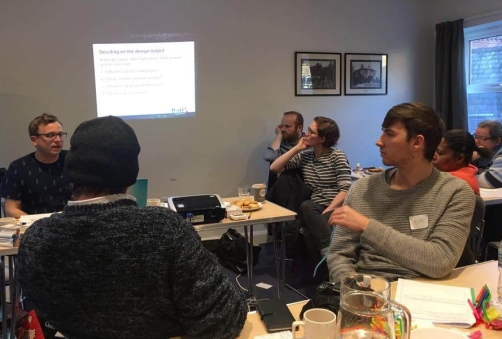How we can unlock poverty
Two people tell of an innovative group project
What would it take to unlock poverty in our society?
For the past two years, three groups with first-hand experience have been working together, drawing on their combined experiences to identify solutions.
The ‘Poverty to Security’ project reached a milestone a few weeks ago, when the groups launched their short animation. If you missed it, take a look:
Thrive Teesside in Stockton, Dole Animators in Leeds and ATD Fourth World in London worked with Dr Ruth Patrick of the University of Liverpool and graphic designer Dan Farley on the project, as well as with staff from the Joseph Rowntree Foundation.
Here, two of the people who took part share their perspectives:
Sarah from Thrive
Is it not an amazing experience when something you have worked so hard to create finally goes live? Oh, I’m not talking about a photoshopped image or a website but a GIF that has been at least two years in the making. For the past two years, Thrive Teesside has been working together with Dr Ruth Patrick and graphic designer Dan Farley on their ideas for 5 Solutions to Poverty.
People with direct experiences of poverty (inc @ThriveTeesside @ATDFourthWorld @doleanimators) have come together to share ideas on how to #solveUKpoverty & build a #goodsociety.
However, a poster for each group just wasn’t enough for us. We wanted bigger – something noticeable for the social media generation, something that people would stand and take notice of. To question why jobs aren’t as secure as they should be, why homes aren’t worth living in or why parents cannot afford to feed their children or even to pay for childcare. Do you know how many grandparents are taking time off work to look after their grandchildren? In all, we wanted people to know why poverty exists at all. There is so much more that we all wanted to pick but only so much space in a GIF.
If you have a Twitter account please please do check out the hashtag #GoodSociety. Our poverty solutions group is a work in progress but we’re well on our way to building a better future and whatever the outcome of it I hope and pray that it is as big a moment in history as that of the Suffragettes who celebrate their 100 year anniversary this year.
Too many people are locked in poverty in Britain today. Join them & spread the word #makingvoicescount
Pat from ATD Fourth World
The people we meet from the other groups are like us: they live in poverty and they want better lives. Getting together is a good opportunity to see what all of us can do. Like us, they are all supporting other people in their lives. We all do things to help look after a person who is not well, or to care for children. Most of us also know what it’s like to have problems with the benefits system. When your benefits are cut, you have to go step by step to make the little money you’ve got last as long as possible, which is not easy.
I live in London, and often we meet in other cities where the other groups are based. So I really love getting out of London. If you’ve had a stressful few weeks, it’s really good to be able to go somewhere else to forget your problems for a while. Outside of London, you can breathe easier and focus your mind on something else.
It’s also helpful to be able to talk to the others in this consensus-building group. We’re all just trying to get by day by day, living in poverty, and trying to survive. Whenever one of us talks, the others know what we’re talking about. Either it’s happened to them already, or it will happen in the near future. We can all relate to each other. We give each other advice on how to go about resolving problems. Even if the person giving advice hasn’t gone through the same situation, they’ve probably experienced something similar. I’ve never heard any bad advice given in this group.
For the next steps in our consensus-building work, I think we need to reach out to the Government with our message, and then see what they have to say about it. The Government doesn’t know what it’s like to have to struggle with the NHS or for school meals. In primary school, children can often get free dinners—but not in secondary school. When your family is struggling, you might get a reduced price for the school dinners, but that’s all. So you have to put money on the card every week, and it’s a real struggle to be able to put enough so that your child can eat dinner ever day. Families in poverty just don’t have enough money. With the NHS, the problem is all the cutbacks. Hearing the government talk about it is scary. They have their own way of doing things. The Parliament says it’s doing things to help; but we don’t see a change. They need to know that more people care about what’s going on. I wish that the government would listen to what people like us have to say. They haven’t experienced what we have; but if they’re interested and willing to listen, that would really help.
